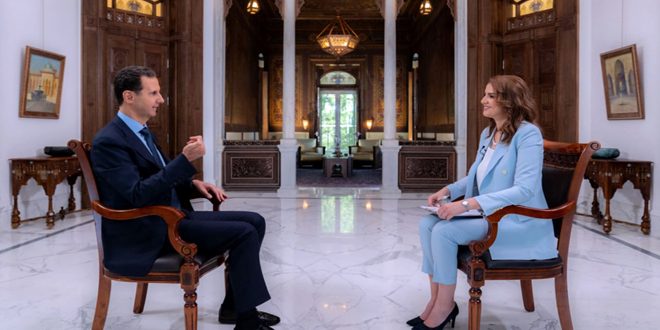For around three hours, President Bashar al-Assad met with a group of Syrian journalists and other researchers, addressing various Syrian “concerns.”
Assad answered a set of questions posed by the attendees, which focused on Syria’s domestic affairs, the effects of the war on Syria’s society and economy, and the economic and living difficulties that Syrians suffer due to the Western-imposed blockade and sanctions.
During the meeting, Assad devoted a specific period to commenting on some current political issues related to the relationship with Syria’s neighbouring countries and nations active on the Syrian file.
On the restoration of relations with Turkey, Assad stressed that the meetings with Ankara are now of an “intelligence nature only,” but “the level of bilateral meetings will soon be raised.” He noted that “Turkey has shown readiness to meet Syria’s demands.”
Assad added during the meeting: “Syria expects deeds, not mere words, from Turkey.”
He continued: “Ankara may be more steadfast in its political orientation than some Arab countries. But it is not possible to judge if Turkey’s position is sincere or just a political maneuver.”
“It is wrong for journalists and researchers to measure the change of policy of any country based on personnel changes,” Assad said. He warned of the potential for positive official Turkish statements aimed at seeking “promotion in return for issuing statements.”
On another topic, Assad indicated that “contact exists with Kurdish forces about the daily problems and inconveniences in terms of living conditions and delivery of some services. He described the relationship with the Syrian Democratic Forces (SDF) as “more like tribalism,” stressing that “dialogue with the Kurdish forces continues, but without new developments.”
Lebanon’s Deputy Speaker Calls for Talks with Syria to Demarcate Maritime Border
As for the United States, Assad stressed that “there is no communication with the Americans, and we are counting on the escalation of popular pressure on the Americans to get out of the [Syrian] territories that they occupy.”
Regarding the relationship with Damascus’ allies, Assad said that “Iran has actively supported Syria and continues to support Syria economically and militarily,” considering that “describing Iran’s position as neglectful is inaccurate.”
As for Russia: “Russia has provided a lot of aid, but the reality today is different after the Russian military operation in Ukraine, and the economic and military pressure on Moscow.”
As for the relationship with Hezbollah, Assad said: “We supported Hezbollah, and we still support it, and we will continue to support it because it is a strategic ally of ours.” He added: “We fear for Lebanon and its future in light of the current reality, as it is Syria’s main flank, and stability in Lebanon is very important for Syria.”
As for Iraq, the relationship with Iraq is one of friendship, and Syria relies on Iraq’s public policy as opposed to individual attitudes.
When asked about restoring relations with the Palestinian Hamas movement, Assad said: “Hamas offered a public apology, which is implicitly an apology to all the Syrian people, during [Hamas official] Khalil al-Hayya’s recent visit.”
Regarding the Arab countries, Assad indicated that Damascus was waiting for the Egyptian position on Damascus to change from the position held by all the other Arab countries. When this was officially discussed, however, Cairo opposed Syria’s return [to the Arab League].
As for the Gulf, Assad described Oman’s position as “the most rational and sincere,” adding that the Emirati position immediately followed Oman’s stance. As for Saudi Arabia and Bahrain: “Saudi Crown Prince Mohammed bin Salman was not hostile, but he faced pressure not to cooperate with the Syrian government.” Assad added: “Despite Bahrain’s small size, it proved bolder in taking the decision to reopen its embassy in Damascus.”
Assad concluded his responses on this note, stressing: “We have no problem in restoring normal diplomatic relations with any country, as was the case before the war. Our only condition is that the country changes its behaviour towards us.” Assad asserted that the Syrian regime is “open to any initiative to raise the level of diplomatic relations, provided that we are not asked to make concessions.”
COMMENT FROM THE OBSERVER
The President’s Media and Political Office confirmed that the aforementioned meeting did not address at any information or details. This was clearly confirmed by President Assad at the end of the meeting, which lasted for four hours when he said: “Our meeting today, as you noticed, was not to give information and explain details, but was based on a discussion and dialogue on ways to view general and current political issues, which in turn can clarify and explore scenarios for the coming political and economic developments. “If the basis of the meeting was to give information and explain current events, this would have been done by sending this information through the usual official channels, whether through the Ministry of Information, Foreign Affairs, or other relevant authorities,” the office said.
This article was translated and edited by The Syrian Observer. The Syrian Observer has not verified the content of this story. Responsibility for the information and views set out in this article lies entirely with the author.


